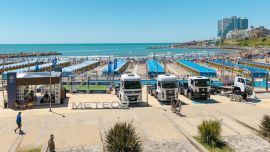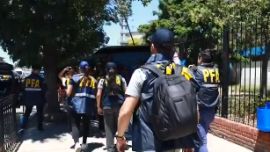THE WEEK IN CORONAVIRUS
At press time yesterday there was a total of 871,468 confirmed cases of coronavirus and 23,225 deaths, as compared to 779,689 cases and 20,599 deaths the previous Friday. On Monday La Rioja backtracked on a decree permitting those recovered from coronavirus free mobility. Last Tuesday marked the 200th day of quarantine with Argentina overtaking Russia’s death toll to move into 12th place worldwide. On Wednesday a new record of confirmed cases (16,447) brought the total for that day up to 840,915, overtaking Peru to place Argentina seventh in the world. On Thursday the Federal Education Council unanimously authorised a return to classes subject to the discretion of each district and based on a system of epidemiological “traffic lights” measuring risk whereby only a green light can permit schools to reopen, Education Minister Nicolás Trotta confirmed that day. But even with a green light (based on nine criteria including buildings being in a fit state as well as a low risk of contagion),
only reduced groups in the final years of primary or secondary school or university may attend classes in shifts. A yellow light with intermediate risk permits an “educational accompaniment” of final-year pupils by teachers but without classes, which will be the situation in the City of Buenos Aires as from next Tuesday. None of the country’s three biggest provinces (Buenos Aires, Córdoba and Santa Fe) can expect a return to classes for now until their number of coronavirus cases comes down.
Finally, on Friday, President Fernández announced 14 days of restrictions on circulation in 18 provinces to try and "minimise" the spread of the virus. "What we are going to do is have measures in different departments of 18 provinces that produce an intense and transitory decrease in the movement of people," said the president.
VENEZUELA SPLITS FRENTE DE TODOS
Following Organisation of American States Ambassador Carlos Raimundi’s controversial remarks in the previous week charging “bias” in United Nations denunciations of human rights violations in Venezuela, Argentina’s ambassador in Geneva Federico Villegas voted on Foreign Ministry instructions in favour of a UN Human Rights Council resolution last Tuesday condemning those violations and extending their investigation for a further two years. The decision prompted Ambassador to Russia Alicia Castro to resign as envoy, as well as triggering fiery outbursts from Mother of Plaza de Mayo leader Hebe de Bonafini and picket activist Luis D’Elía among other Kirchnerite voices.
ROSENKRANTZ FIGHTS BACK
Frente de Todos deputy Vanesa Siley on Monday presented a bill seeking the impeachment of Supreme Court Chief Justice Carlos Rosenkrantz for malfeasance in what was widely seen as a government backlash to the previous week’s Supreme Court per saltum halting the Senate displacement of three judges involved in trials of Vice-President Cristina Fernández de Kirchner. Yet Siley’s grounds for impeachment were not based on this issue but on alleged legal strategies on the part of Rosenkrantz seeking the impunity of state terrorists. The chief justice dismissed the impeachment drive as a “smear campaign” based on “completely unfounded” accusations and “motivated by political interests,” also denying have 70 overseas accounts. The request for his impeachment originated on September 25, four days before the Supreme Court unanimously decided to accede to the per saltum. In order to advance with the impeachment, Frente de Todos need a two-thirds majority in the Chamber of Deputies and a similar majority in the Senate in order to remove the magistrate but lack both.
MARKETS: BLUE HITS RECORD HIGH
The gap between official and parallel exchange rates is again a three-digit percentage with the “blue” dollar soaring as high as 167 pesos yesterday as against 149 pesos the previous Friday. Meanwhile the official exchange rate climbed during the week from 81.50 to 83 pesos, as quoted by Banco Nación. Country risk was less volatile, closing the week at 1,337 points slightly down from 1,356 the previous Friday.
IMF IN TOWN
On Monday the government summoned leading businessmen and trade unionists to the Casa Rosada where there was agreement to set up tripartite panels for key sectors but no concrete announcements. The move was interpreted as a bid to convey an image of consensus-seeking ahead of the International Monetary Fund (IMF) mission about to arrive in town. Apart from government ministers and the Central Bank helm, the IMF mission also met with CGT labour leaders and the Argentine Industrial Union (UIA) on Thursday, as well as with lower house Budget Committee chairman Luciano Laspina, an opposition politician. The mission denied pressing for austerity.
INDUSTRY SLUMP
For the first time since May industrial production and construction activity both fell below the levels of the previous month for August. The falls were 7.1 percent and 17.7 percent respectively when measured against the August of 2019. Only 54.1 percent of manufacturers reported working normally in August while the cumulative plunge in industrial production for the year up to that month was 12.5 percent, INDEC statistics bureau reported.
WHEAT FIRST
Argentina has approved HB4 drought-resistant genetically modified wheat by biotechnology firm Bioceres SA, the company and the government said on Wednesday, making it the first country in the world to approve a strain of GMO wheat. No country has yet given the green light to importing such products and Bioceres said it will only begin marketing once it is approved for importation by Brazil, Argentina’s biggest wheat market absorbing 45 percent of last year’s 11.3-million-tonne harvest.
GUERNICA DEADLINES
With the third (and not necessarily last) deadline for the eviction of land illegally occupied in the Greater Buenos Aires zone of Guernica falling due next Wednesday, 500 families have already signed an agreement with the Buenos Aires provincial government to withdraw, around a quarter of the squatters. But provincial Community Development Minister Andrés Larroque negotiating daily with the squatters warned that they also included a “pseudo-revolutionary” sector looking for a conflict while acknowledging “very concrete” housing needs. On Thursday there was a leftist demonstration in the provincial capital of La Plata against the eviction. Elsewhere land seizures continued in Villa Mascardi in Neuquén and began in Rosario.
WRONGFULLY ACCUSED
The Supreme Court on Thursday unanimously acquitted taxi-driver Jorge Enrique González Nieva after having served almost half of a 25-year prison sentence for a homicide during a bank robbery in which he never took part. The Court ruled that he had been denied his constitutional guarantees of a fair trial and presumption of innocence, being convicted solely on a single witness’s identification of the man’s photograph although no other witness recognised him. Analía Aguerre, 43, was shot dead by motorcyclists in the course of the 2006 bank robbery in Merlo.
RIP GABO
The versatile Gabriel Fernando “Gabo” Ferro – singer, poet, artist, historian, playwright and teacher – died on Thursday at the age of 54.
He started his career in 1992 with the hard rock band Porco.
UPMARKET CONSTRUCTION
The City Legislature on Thursday gave first reading by a 35-22 vote to a bill to construct 10 blocks of luxury flats in Costa Salguero in an initiative which the opposition criticised as "privatising the riverside." The row looks set to continue.
CRISTINA v GOOGLE
The Supreme Court on Thursday afternoon unanimously rejected Google’s request for a per saltum in the lawsuit lodged against the Internet giant by Vice-President Cristina Fernández de Kirchner, declaring it "inadmissible." The vice-president had sued Google in early August over a search engine entry which had been hacked to give her job description as "thief of the Argentine nation."


























Comments